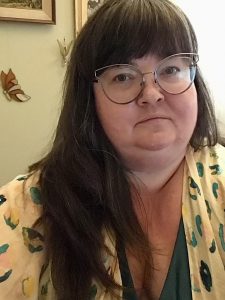 Danu Anthony Stinson, PhD
Danu Anthony Stinson, PhD
Dr. Stinson is an Professor in the Department of Psychology at the University of Victoria, British Columbia, Canada.
Dr. Stinson studies the social self, with a focus on understanding how people navigate social scripts, including script violations, and cope with threats to belonging like rejection and social stigma. She also seeks to identify, and help people overcome, social-psychological barriers to well-being. Dr. Stinson teaches undergraduate classes on social psychology (PSYC 231) and close relationships (PSYC 375, PSYC 431H).
“In general, I try to apply a critical, intersectional feminist lens to social psychological methods and theories in my scholarship (though these approaches are often strange bedfellows). So a lot of my work that is ongoing right now focuses on the experiences of folks who are subjected to social marginalization, and trying to understand how reclaiming social identity and community building helps such groups to weather the daily pressures of social marginalization and stigma.
“So for example, with the support of a grant from the Social Sciences and Humanities Council of Canada, some of my current students are examining how fat people, people with disabilities, and queer people (these are, of course, overlapping groups) reclaim their social identities and form community to recover from internalized stigma. We have also conducted community-based research with Island Health looking at self-change, belongingness, and well-being among people taking part in a community support program for substance use recovery. Together with my students, I am also continuing my work examining gender as an aspect of identity and a social role that influences a range of experiences, including experiences initiating and maintaining romantic relationships and working in male-dominated fields, like the military.
 “An overarching goal of all of this work is to study experiences of self, identity, and belongingness that are typically overlooked in social psychological science, with a focus on centering the lived experiences of the under-represented groups whom we hope to study. Most of my research these days is student led. For this reason, I am very interested in recruiting and working with students who have lived experiences as well as academic/scholarly experiences in the topics we study. I am particularly interested in working with students who identify as members of groups that are equity-deserving and under-represented in the academic discipline of psychology. I am also interested in conducting more community-based research in the future, as community partnerships provide an excellent opportunity for mutual learning and seeing the tangible benefits of research.”
“An overarching goal of all of this work is to study experiences of self, identity, and belongingness that are typically overlooked in social psychological science, with a focus on centering the lived experiences of the under-represented groups whom we hope to study. Most of my research these days is student led. For this reason, I am very interested in recruiting and working with students who have lived experiences as well as academic/scholarly experiences in the topics we study. I am particularly interested in working with students who identify as members of groups that are equity-deserving and under-represented in the academic discipline of psychology. I am also interested in conducting more community-based research in the future, as community partnerships provide an excellent opportunity for mutual learning and seeing the tangible benefits of research.”
